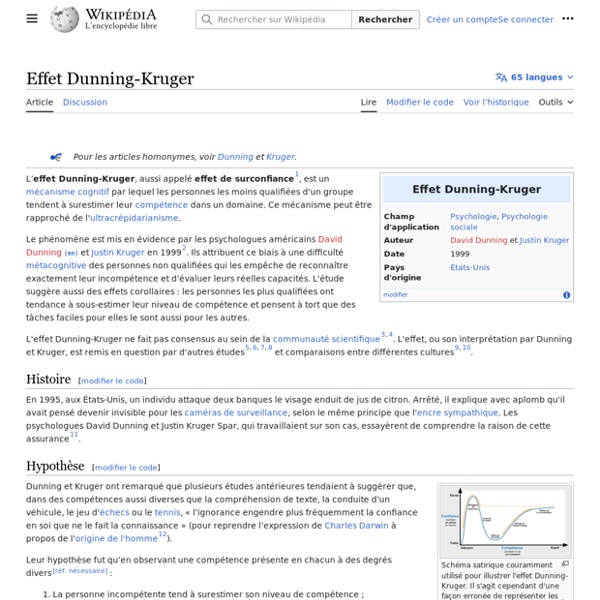



https://fr.wikipedia.org/wiki/Effet_Dunning-Kruger
Related: Formation (par et pour) • Se déconditionner • Biais cognitifs • Politique / SocioThe 5 Minute Lesson Plan Series Reading Time: 3 minutes. Updated August 2017 Welcome to The 5 Minute Series, downloaded in over 210+ countries across the world! The original 5 Minute Lesson Plan format is now available in digital format. This was 18 months in development and has now been used in over 80+ countries. Illusion of transparency - Wikipedia The illusion of transparency is a tendency for people to overestimate the degree to which their personal mental state is known by others.[1] Another manifestation of the illusion of transparency (sometimes called the observer's illusion of transparency) is a tendency for people to overestimate how well they understand others' personal mental states. This cognitive bias is similar to the illusion of asymmetric insight. Experimental support[edit] For her PhD dissertation in psychology at Stanford University, Elizabeth Newton created a simple test that she regarded as an illustration of the phenomenon.[2] She would tap out a well-known song, such as "Happy Birthday" or the national anthem, with her finger and have the test subject guess the song. People usually estimate that the song will be guessed correctly in about 50 percent of the tests, but only 3 percent pick the correct song. Public speaking and stage fright[edit]
apophenia » Why America is Self-Segregating Many in the tech world imagined that the Internet would connect people in unprecedented ways, allow for divisions to be bridged and wounds to heal.It was the kumbaya dream. Today, those same dreamers find it quite unsettling to watch as the tools that were designed to bring people together are used by people to magnify divisions and undermine social solidarity. These tools were built in a bubble, and that bubble has burst. Nowhere is this more acute than with Facebook. Naive as hell, Mark Zuckerberg dreamed he could build the tools that would connect people at unprecedented scale, both domestically and internationally.
Memory not memories – teaching for long term learning – primarytimerydotcom It seems like a life time ago but this time last week I should have been at ResearchEd, listening to great speakers and getting butterflies about my session later that day. Except that I slipped on the hardboard down on the kitchen floor courtesy of our kitchen refit and ended up in A&E instead. Luckily nothing is broken and my leg is slowly getting better. I’m so sorry I couldn’t be there. False attribution False attribution can refer to: Misattribution in general, when a quotation or work is accidentally, traditionally, or based on bad information attributed to the wrong person or groupA specific fallacy where an advocate appeals to an irrelevant, unqualified, unidentified, biased, or fabricated source in support of an argument.[1] Fallacy[edit] The fallacy of false attribution is a type of appeal to authority, where the proponent either hides or puffs up the credentials or credibility of the source to enhance an argument.
A longer piece on the taxonomy of Bloom Benjamin Bloom developed a taxonomy for goals in education, and frankly: One of the most asked questions I received is ‘is Bloom correct’. For the people who haven’t heard about the taxonomy before, it is often represented like this: But did you notice, I didn’t write: this is the taxonomy, I wrote it’s often represented. During Spring a lot of edubloggers wrote about this by the likes of David Didau and Doug Lemov and on Twitter Dylan William proposed this correction: But now it’s getting really interesting as Lorin W. Nut Island effect The Nut Island effect describes an organizational behavior phenomenon in which a team of skilled employees becomes isolated from distracted top managers resulting in a catastrophic loss of the ability of the team to perform an important mission. The term was coined by Paul F. Levy, a former Massachusetts state official, in an article in the Harvard Business Review published in 2001. The article outlines a situation which resulted in massive pollution of Boston Harbor, and proposes that the name of the facility involved be applied to similar situations in other business enterprises.
Information cascade An Information cascade or informational cascade is a phenomenon described in behavioral economics and network theory in which a number of people make the same decision in a sequential fashion. It is similar to, but distinct from herd behavior.[1][2][3] An information cascade is generally accepted as a two-step process. For a cascade to begin an individual must encounter a scenario with a decision, typically a binary one. Second, outside factors can influence this decision (typically, through the observation of actions and their outcomes of other individuals in similar scenarios).